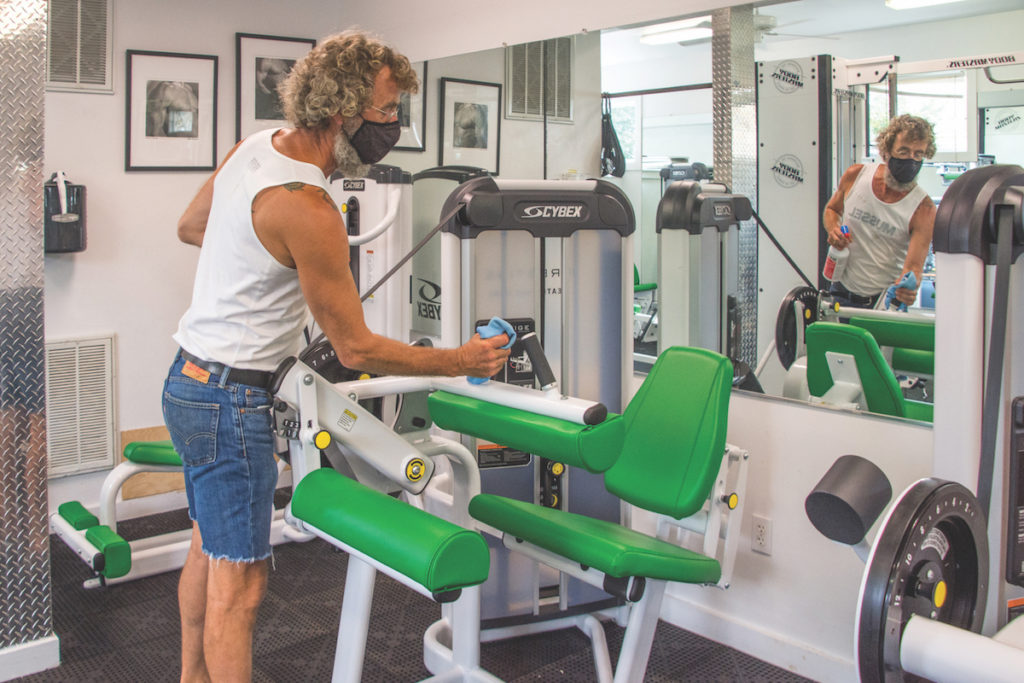
PROVINCETOWN — As statewide Covid-19 rates spiked last week, Gov. Charlie Baker tightened pandemic restrictions from the Boston State House. Designed to tamp down the carnage of the holiday season, his measures went into effect at 12:01 a.m. on Dec. 26; they’ll last at least until Jan. 10, 2021, with the possibility of extension.
The new rules limit indoor gatherings to 10 people, outdoor ones to 25. And they lower capacity limits for a wide variety of businesses from the 40- to 50-percent range to 25 percent. That affects driving schools, casinos, movie theaters, restaurants — and gyms.
When Covid shuttered fitness centers last March, gym rats of all sorts, from protein-based to Pilates-obsessed, found themselves at a loss. “The first thing we did was cry,” the Boston-based Scott Eischen and Mike Bruning (Herculean both) told the Independent this summer.
Straits proved less dire for people like Dave Oliver, owner of Provincetown’s Cape Tip Sportswear, who said he was inundated with requests for hard equipment: dumbbells, resistance bands, yoga mats, TRX systems. “No one’s ever asked me for those things before,” he said in August.
But now, five months after Phase Three initially reopened gyms and ten months since the start of this new American normal, the news that Massachusetts health clubs are inching back towards shutdown is, at least on the Outer Cape, inciting a different, much less frenzied reaction.
“To be honest,” said Joseph LeBlanc, manager of the Provincetown Gym, “I hadn’t even thought about the new rules affecting us.”
The Provincetown Gym had a normal, pre-pandemic capacity of 182 people: 156 upstairs, 26 downstairs. But the combination of plexiglass barriers between the machines and requisite social distancing “seriously limits space,” said LeBlanc. Since July, the gym has operated at a reduced maximum of 25 people — just 13.7 percent of capacity.
“We haven’t reached that maximum once since we opened,” said LeBlanc. “I don’t even think we’ve come close. Our numbers are down drastically compared to normal winters, which are really slow anyway. It feels so empty.”
Mussel Beach Health Club, Provincetown’s other fitness destination, is now allowing in 18 people at once, exactly 25 percent of its 72-person capacity, down from 30 people, or 40 percent, last week. It is more of an off-season hub than is the Provincetown Gym, but still, the two establishments face similar situations. “Sometimes we have people,” said Mussel Beach’s Natalie Ballesteros. “Sometimes.”
The gyms’ waning popularity makes sense in pandemic terms; for all but the most devoted fitness freaks, the thought of entering an enclosed space where patrons breathe heavily on purpose can seem daunting. But, said LeBlanc, it makes sense for another reason, too.
Before Covid, people relied on gyms and in-person classes for their fitness. Thus those early requests to Cape Tip Sportswear’s Oliver for personal gym equipment: worried about quarantine blubber, people sought, early on, to replicate the gym at home. As the months have ticked on, though, it seems there’s been a collective shift in what people want from exercise.
For swaths of people stuck at home in front of Zoom screens all day, exercise has become less about intensity and aesthetics, more about re-grounding, reconnecting, and above all interacting with the world around them. Even in winter weather.
“I never get asked for yoga mats and dumbbells and all that anymore,” said Oliver. “It’s all about sneakers, gloves, hats, socks. We’re almost out of long underwear. Everybody wants to be outside — biking, walking, seeing people, breathing fresh air.”
And, said Oliver, it’s not just that his sneaker sales are through the roof. Shoe-shoppers are looking for distinctly higher-quality products than they used to.
“They don’t just want the shoes they can wear to the gym once a week,” he said. “They’re planning on being out there way more often, putting a lot of miles on their shoes.” And biking fanatics would usually have tailed off by this point in the season, “but,” he said, “they just keep coming in.”
LeBlanc recognizes the phenomenon that’s leeching his business. He doesn’t resent it. “Staying healthy is very much a mindset,” he said. “You gotta do what you gotta do. The gym doors will stay open. People will come back when they’re ready.”



